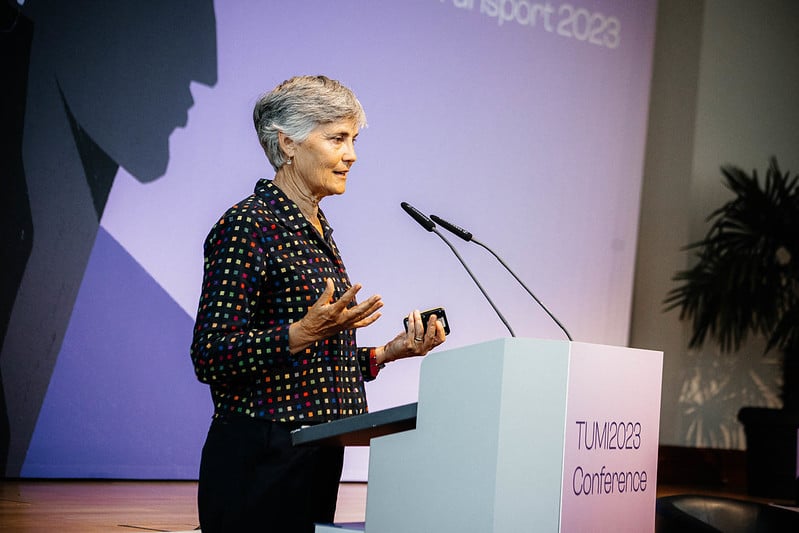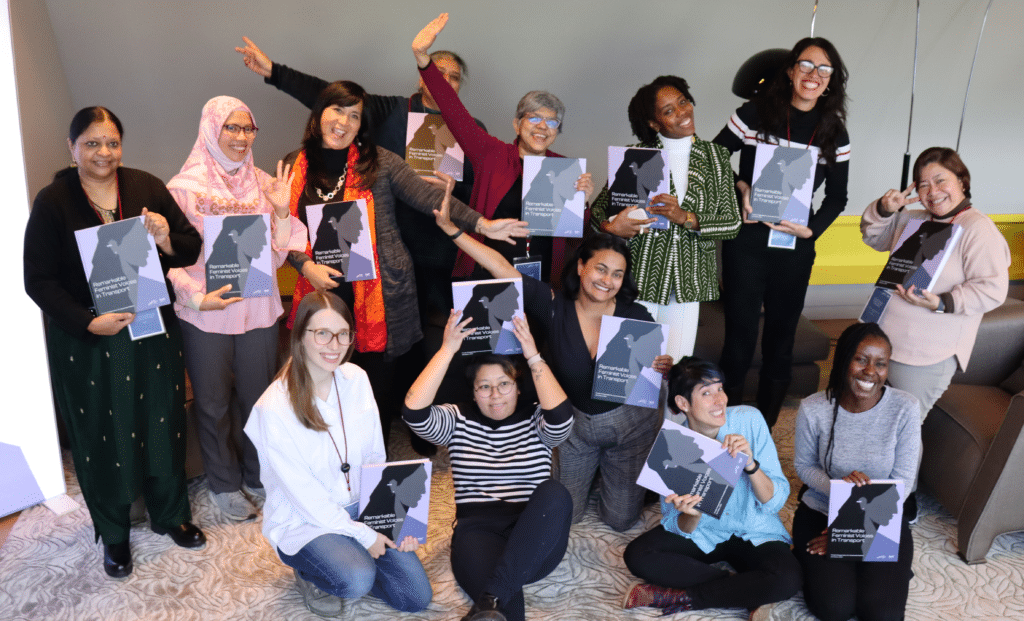When the planning for a high-level Women Mobilize Women study tour in Berlin began in late September 2022, no one on the team could have envisioned how it would come together. The goal seemed simple: bring highly influential women from around the world, particularly those based in the Global South , together in one room for an incredible opportunity for intergenerational and intercontinental learning. At a time where the German Ministry for Economic Cooperation and Development (BMZ) has stated its priorities for feminist development policy, this was the ideal moment.
Next began the monumental task to select the 30 women to comprise our Remarkable Feminist Voices in Transport, and from them, select the 20 who would join us in Berlin from the 27th of February to 3rd of March. While there are countless women raising their voices to establish gender equitable and just mobility, the group coming from 13 countries to learn together in Berlin were perfect representatives and leant to a memorable week.
I had the immense pleasure of launching our week with a full day of workshops focused on celebrating the women’s individual achievements, discussing common roadblocks, and establishing a focus for finding a path forward. From the first moment, it was clear the caliber of the women present; their success, but also their humbleness. Often in these settings, we feel compelled to share tangible results, specific, measurable projects. Many responses seemed to be accompanied with the caveat that the women present were uncertain why they were nominated as a remarkable woman when there are so many others doing incredible work. In this space, I reminded each of them that our successes are not always visible. It is the ongoing legacies of their work that brought them to this space, with each of them worthy of recognition.
Discussions throughout the week reinforced that many of the women present and those around the world are facing very similar challenges, even in the varied contexts of their home cities:
- lack of sufficient resources,
- gaps in available gender-focused data,
- lack of representation in decision-making positions, and,
- most importantly, the perpetual fear of gender-based violence.
At the end of day two, the latter became the focus of conversation: How can we address the fear that women face from the moment they step out of their front door to provide dignified transport? Many agencies focus on measures that address the issue after it has occurred—such as better reporting systems, cameras in public transport, panic buttons—without tackling the root cause. The solutions are not easy, and in most cases still waiting to be successfully defined, but one thing was clear: we need to collectively shift from victimizing women (both from the actual violence and the responsibility to report afterwards), to naming and blaming the perpetrators of violence – men.
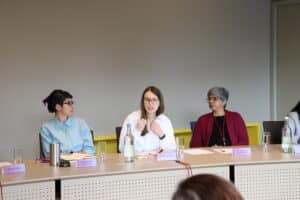
As the women discussed their projects, policies, programmes, and challenges, it was repeatedly noted that the role of states like Germany in supporting LATAM, Africa, and Asia is to provide the resources and funding needed to support initiatives that are managed and run by local experts and practitioners . During a session focused on building resiliency in Sub-Saharan Africa, Charlène Kouassi of Movin’On LAB Africa noted she entered this field because she couldn’t stand by knowing there are so many great solutions on the African continent that can’t be scaled up due to funding and financing.
The women leading these programmes and the programmes themselves should be supported to build resiliency and to empower women.
Serendipitously, the team awoke Wednesday to learn that German Ministers Svenja Schulze from BMZ and Annalena Baerbock from the Federal Foreign Office (AA) would announce the new strategies for Feminist Foreign and Development Policy The significance if these new strategies and the potential funding commitments along with it are immense. It sets clearly at the national level a recognition of the important of feminist programming, that it is no longer just a niche idea. What this will look like is still to be clarified in the weeks and months to come, but one thing is clear: Germany is committed to a more feminist future.
To encapsulate the countless conversations held throughout the week would create enough content to fill a whole book, but in reflecting I am convinced that it is only through empowering this global community of women that we will find the strength to dismantle existing patriarchal systems and realize more gender equitable, feminist mobility. As Abimbola Akinajo, MD of LAMATA said,
“Women should not be naïve to think that men will open the door for women.” Patricia Nzolantima, venture capitalist and founder of Bizzoly took this one step further to say, “If you can’t get a seat at the table, build your own table!”
Mujeres en Movimiento (Women in Motion), first realized five years ago at the inaugural WMW Conference in 2018, has shown the power a community of women has to create a space for empowerment, leadership, networking, and representation. In LATAM they are increasing the number of women in decision-making positions, holding the space behind them for the next generation and seeing the change. Leveraging the community created throughout the week of the study tour, along with each of our individual communities, is how we will continue to strengthen and empower each other.
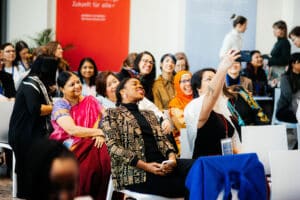
Now on the train ride home, writing this summary, I am excited by the network of women I was privileged to share this week with, and what we will go on to achieve together. I keep recounting the words of Kalpana Viswanath, Founder of Safetipin, shared during her keynote at Thursday’s awards ceremony. How the stories we share of our experiences in public space are our love letters to our cities: They recount the blossoming of new love, forging of friendships, witnessing children grow, and become the fibres of who we are as individuals and a collective. As we continue this work realizing a feminist reimagining of our transport systems and our cities, these stories are love letters to the next generation of women and girls who will find joy in their streets. As stated by Naomi Mwaura,
I do the work I do with the hope that the next generation of women and girls will hear stories of our struggles with representation, access, and violence and say, ‘Really? I can’t believe it!
To realize that feminist future will be truly remarkable!
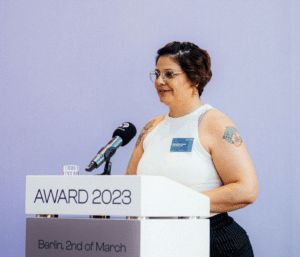
Text by Melissa Bruntlett
The book “Remarkable Feminist Voices in Transport 2023” with interviews featuring all awardees and selected organisations that do remarkable feminist work in the transport sector is available online: Remarkable Feminist Voices in Transport – WomenMobilizeWomen
